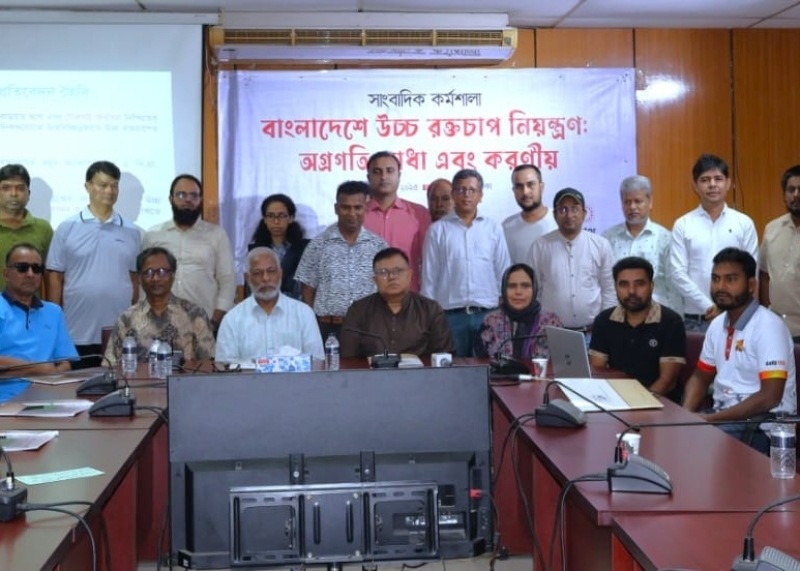- No response on request for Hasina’s extradition: Touhid Hossain |
- Deep relations with US, economic ties with China: Touhid |
- Recommendations on July Charter implementation submitted to CA |
- Cyclonic storm ‘Montha’ now severe cyclonic storm; unlikely to hit BD |
- Gaza Families Face Dire Shortages as Aid Efforts Expand |
Progress in controlling hypertension encouraging, not sufficient

Workshop on control of hypertension in Bangladesh held on Tuesday.
Dhaka, Oct 28 - Speakers at a workshop on Tuesday said though one-fourth of the population is still suffering from hypertension the ongoing initiatives are not enough to reduce the growing burden.
They came up with the observation at a two-day workshop for journalists titled “Hypertension Control in Bangladesh: Progress, Challenges and Way Forward” started on 27th October at the capital's BMA Bhaban.
They said uninterrupted supply of anti-hypertensive medicine must be ensured at all community clinics and upazila health complexes.
The workshop was organised by research and advocacy organization PROGGA (Knowledge for Progress) with support from Global Health Advocacy Incubator (GHAI).
Twenty-three journalists working in print, television and online media participated in the workshop.
Bangladesh has been recognized as a successful example in the recently published second Global report on hypertension by World Health Organisation (WHO).
Between 2019 and 2025, the rate of hypertension control increased from 15 percent to 56 percent in some regions of Bangladesh showing a promising improvement.
Speakers also said at the workshop that hypertension remains a major public health challenge that causes premature deaths.
The WHO report identified ensuring availability of free anti-hypertensive medicine at the grassroots level as a significant step toward controlling the disease and stressed continued investment in this sector for long-term sustainability.
Dr. Muhammad Habibur Rahman, Deputy Director, Directorate General of Health Services (DGHS), said, “We are experiencing certain budgetary and management constraints in providing medicines for hypertension and other non-communicable diseases (NCDs). However, we are hopeful that these issues will be resolved soon.”
Riad Arafin, Deputy General Manager (Sales & Marketing), Essential Drugs Company Limited (EDCL), said, “We always try to ensure that anti-hypertensive medicines are supplied on time to NCD corners and Community Clinics for the people living at the grassroots level and we remain committed to its continuation.”
Muhammad Ruhul Quddus, Bangladesh Country Lead of GHAI and ABM Zubair, Executive Director, PROGGA and Reaz Ahmad, Editor, Dhaka Tribune were present at the workshop as discussants.
PROGGA’s Coordinator Sadia Galiba Prova delivered presentations on hypertension control. - UNB

